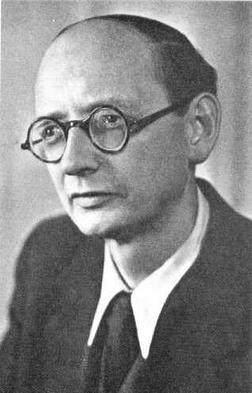Oskar Becker facts for kids
Oscar Becker (born September 5, 1889 – died November 13, 1964) was a smart German thinker. He was a philosopher, a logician (someone who studies how we reason), and a mathematician. He also studied the history of mathematics.
Contents
Early Life and Studies
Oscar Becker was born in Leipzig, Germany. He first studied mathematics there. In 1914, he finished his main math paper about how to break down shapes into triangles.
He fought in World War I. After the war, he went back to school to study philosophy. He worked with a famous philosopher named Edmund Husserl. Becker later became Husserl's assistant.
Thinking About Math and Philosophy
In 1927, Becker published an important book called Mathematical Existence. In this book, he explored deep ideas about math. He also looked at the work of another philosopher, Martin Heidegger.
Becker talked about how we count numbers. He connected this to big ideas about life and death. Some other thinkers didn't agree with his ideas. His work didn't become super famous in the field of math foundations.
Becker also had debates with famous mathematicians like David Hilbert. They argued about whether we can truly imagine "endless" numbers in math. Becker believed that even Hilbert's ideas needed to accept the idea of numbers going on forever.
Logic and Possibility
Becker helped to start formalizing intuitionistic logic. This is a type of logic where you only accept things you can actually build or prove. He tried to explain it using Husserl's ideas. Another logician, Arend Heyting, used Becker's work.
Becker also made contributions to modal logic. This is a type of logic that deals with ideas of "necessity" (what must be true) and "possibility" (what could be true). There is even something called Becker's Postulate named after him. It talks about how possibility can lead to necessity.
History of Ancient Greek Math
Becker also studied the history of ancient Greek mathematics. He talked about a "crisis" in Greek math. This happened when they found out about "incommensurable" numbers. These are numbers that cannot be written as a simple fraction. An example is the diagonal of a square. This discovery was a big shock for Greek mathematicians.
Becker suggested that this shock made Greek mathematicians like Euclid avoid using numbers directly in their geometry. Instead, they used ratios and proportions. Becker also showed how many of Euclid's proofs could be understood using a different kind of logic.
Some newer historians, like Wilbur Knorr, have said that Becker and others might have seen their own modern problems in ancient Greek history.
Later Life and Reputation
Oscar Becker wrote many letters to important mathematicians and philosophers. These included David Hilbert and Hermann Weyl. Sadly, many of these letters were lost during World War II.
Becker's later ideas might have been less popular because of his support for the Nazi party. He was seen as loyal to National Socialism, even though he wasn't a party member. This made some people avoid his work, especially those who had to leave Germany because of Hitler.
Two of Becker's students, Jürgen Habermas and Hans Sluga, later looked at how Nazism affected German universities.
Oscar Becker died in Bonn, Germany, when he was 75 years old.
See also
 In Spanish: Oskar Becker para niños
In Spanish: Oskar Becker para niños
- Transcendental phenomenology
Images for kids
 | Lonnie Johnson |
 | Granville Woods |
 | Lewis Howard Latimer |
 | James West |



